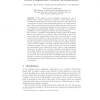Free Online Productivity Tools
i2Speak
i2Symbol
i2OCR
iTex2Img
iWeb2Print
iWeb2Shot
i2Type
iPdf2Split
iPdf2Merge
i2Bopomofo
i2Arabic
i2Style
i2Image
i2PDF
iLatex2Rtf
Sci2ools
123
click to vote
CRYPTO
2005
Springer
2005
Springer
Secure Computation Without Authentication
In the setting of secure multiparty computation, a set of parties wish to jointly compute some function of their inputs. Such a computation must preserve certain security properties, like privacy and correctness, even if some of the participating parties or an external adversary collude to attack the honest parties. Until this paper, all protocols for general secure computation assumed that the parties can communicate reliably via authenticated channels. In this paper, we consider the feasibility of secure computation without any setup assumption. We consider a completely unauthenticated setting, where all messages sent by the parties may be tampered with and modified by the adversary (without the honest parties being able to detect this fact). In this model, it is not possible to achieve the same level of security as in the authenticated-channel setting. Nevertheless, we show that meaningful security guarantees can be provided. In particular, we define a relaxed notion of what it me...
Related Content
| Added | 26 Jun 2010 |
| Updated | 26 Jun 2010 |
| Type | Conference |
| Year | 2005 |
| Where | CRYPTO |
| Authors | Boaz Barak, Ran Canetti, Yehuda Lindell, Rafael Pass, Tal Rabin |
Comments (0)

